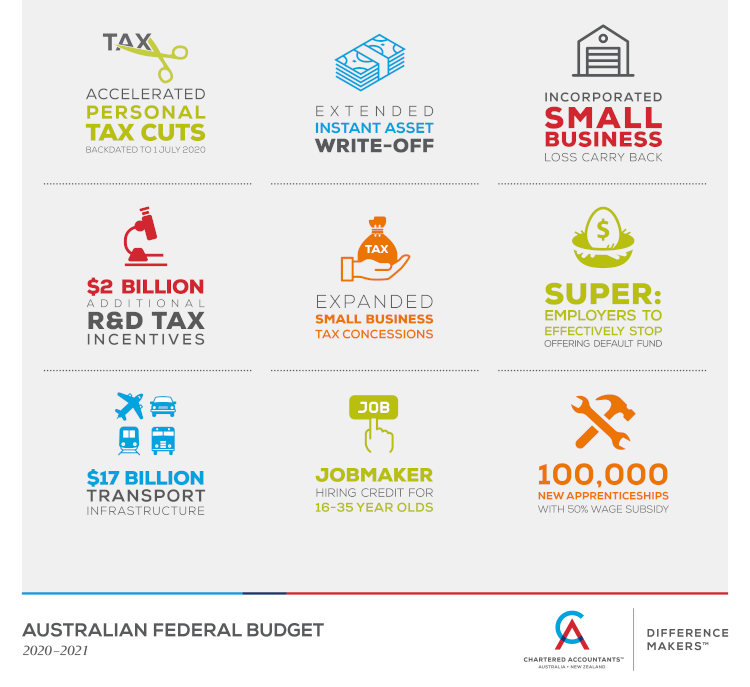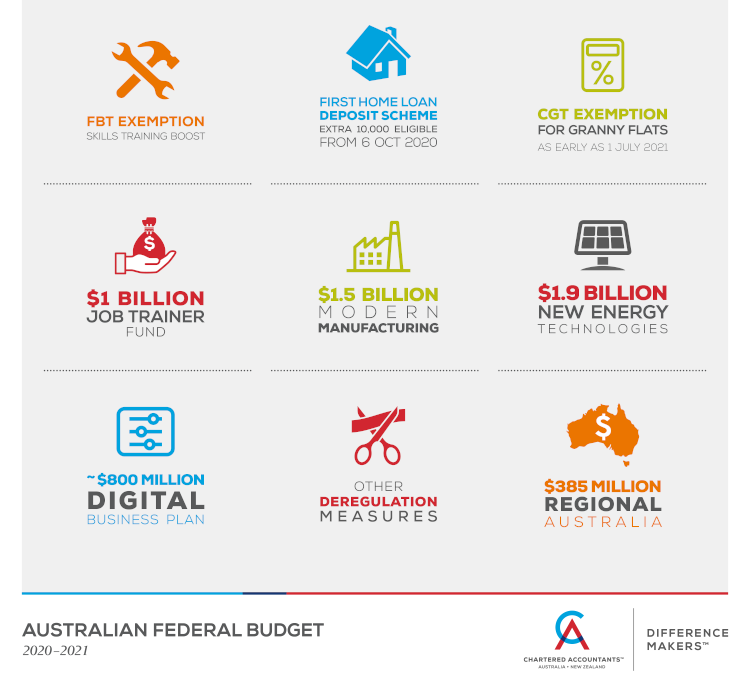2020 Federal Budget – What it means for you
To kickstart the economy after Australia’s massive COVID-19 close down, the Federal Government has released a huge spending and tax cuts Budget for 2020.
There appears to be support for the young, anyone still working and business owners. Self-funded retirees received nothing directly but may see follow on effects of budget stimulus measures.
There are a number of key areas we would like to make you aware of, which we’ve split into two sections – Business and Individuals.
Business Owners
Tax Loss “Carry Back”
If your business is making losses now because of the COVID-19 recession, you can get a tax refund out of the taxes you have paid on profits going back to the 2019 year. You can also use this “carry back loss” trick for the 2021 and 2022 financial years.
Specifically, a company can carry back losses from the 2020, 2021 and 2022 financial years to offset previously tax profits in the 2019, 2020 and 2021 financial years.
However, this only applies to companies. Sole traders, partnerships and trusts won’t be able to access this benefit.
This tax refund will be available as a choice to be made when a company lodges its 2021 and 2022 Tax Returns.
 Immediate Asset Write Off
Immediate Asset Write Off
The Government wants businesses to spend big. This measure allows businesses with a turnover of less than $5 billion to claim a full up-front tax deduction for the cost of new business assets. There is no cost cap with this measure – it is not limited like the previous $150,000 instant asset write off that is in place until 31 December 2020.
This applies to the purchase of capital assets from 6 October 2020 and first used or installed by 30 June 2022.
This means that if you buy a new truck for $60,000, then you get a 100% tax deduction in year one.
Important: Remember, this does NOT mean that you get $60,000 in tax back. You effectively save tax at your marginal tax rate. So, a company with a 26% tax rate will save $15,600 in tax if they buy a $60,000 truck. The standard Motor Vehicle Cost Limit ($59,136 for 2021) is still expected to apply to cars.
For businesses with a turnover under $50 million, this also applies to secondhand assets.
Small Business Pooling – Immediate Write Off
Small business entities that have a turnover of less than $10 million using the simplified depreciation rules can claim as an expense the balance of their simplified depreciation pool at the end of the 2021 year.
This is great because it brings forward a business owners’ tax deduction for the full amount of non-depreciated assets they have purchased in prior years.
JobMaker Hiring Credit
The JobMaker hiring credit will be available to eligible employers over 12 months from 7 October 2020 for each additional new job they create for an eligible employee.
Employers will receive $200 a week for hiring someone aged 16 to 29 and $100 a week for taking on someone aged 30 to 35.
The JobMaker hiring credit will be paid quarterly in arrears and will be available for 12 months from the date of employment with a maximum amount of $10,400 per additional new position created.
To be eligible, the employee will need to have worked for a minimum of 20 hours per week averaged over a quarter, and have received the JobSeeker Payment, Youth Allowance or Parenting Payment for at least one month out of the three months prior to when they are employed.
Employers will need to prove that the new employee will increase overall employee headcount and payroll.
Boosting Apprenticeship Commencements
A business that takes on a new or recommencing Australian apprentice will be eligible for a 50% wage subsidy. The subsidy is paid in arrears and is available for wages paid from 5 October 2020 to 30 September 2021, up to a maximum amount of $7,000 per quarter.
FBT Changes
A number of FBT changes have been announced, including removal of FBT on car parking and portable electronic devices from 1 April 2021, and on retraining and reskilling costs for employees from 2 October 2020.
R&D Tax Incentive Changes
The Government has backflipped on previously proposed cuts to research and development tax incentives.
For small companies (turnover less than $20 million) the refundable R&D tax offset will be set at 18.5% above the company tax rate and there won’t be any cap on annual cash refunds.
The R&D laws are quite complex, so please feel free to contact us for further information is R&D is something that your business would like to claim.
 Individuals
Individuals
Personal Tax Cuts
In an attempt to kick start the economy, the Government is bringing forward previously legislated tax cuts totalling $50 billion. These were to commence from 1 July 2022, however, will be backdated to 1 July 2020.
There are 2 key parts to it. An offset which will get paid in a lump sum after July next year when you lodge your 2021 Tax Return, and an immediate reduction in the tax taken from your wages as soon as this legislation passes Parliament.
In both cases there is nothing you need to do and no extra forms to fill out at tax time – the adjustments will happen automatically.
Here’s what tax cuts you’ll get:
| 2019-20 | 2020‑21 | ||||||
| Taxable Income | Tax Liability | Tax Liability | Change in Tax | ||||
| ($) | ($) | ($) | ($) | (%) | |||
| 40,000 | 4,467 | 3,887 | ‑580 | ‑12.9 | |||
| 60,000 | 11,067 | 9,987 | ‑1,080 | ‑9.8 | |||
| 80,000 | 18,067 | 16,987 | ‑1,080 | ‑6.0 | |||
| 100,000 | 25,717 | 24,187 | ‑1,530 | ‑5.9 | |||
| 120,000 | 34,117 | 31,687 | ‑2,430 | ‑7.1 | |||
| 140,000 | 42,097 | 39,667 | ‑2,430 | ‑5.8 | |||
| 160,000 | 49,897 | 47,467 | -2,430 | ‑4.9 | |||
| 180,000 | 57,697 | 55,267 | ‑2,430 | ‑4.2 | |||
| 200,000 | 67,097 | 64,667 | ‑2,430 | ‑3.6 | |||
The average teacher’s wage is around $90,000, so a couple who both teach can expect a tax cut of up to $3,060. The big question is if people will spend these tax cuts or reduce their home mortgages and save them.
$250 Economic Support Payments
A payment of $250 in December 2020 and another payment of $250 in March 2021 will be made to individuals receiving Age or other pensions and health care card holders. These payments will be exempt from tax and will not count as income support for any income support payments.
Superannuation – “Stapling” of Accounts
This is something that really makes sense. Under this measure, an individual’s super account will be “stapled” to them as they change jobs. New super accounts will no longer be automatically created every time someone starts a new job.
Capital Gains Tax removed from “Granny Flats”
Currently, there is a risk of capital gains tax (CGT) applying if you sell your family home and if you have entered into a formal granny flat arrangement with an elderly parent or relative. The Budget has now included a measure where CGT will not apply to this.
First Home Loan Deposit Scheme – additional 10,000 places.
The Government will allocate an additional 10,000 places for first home buyers under the existing First Home Loan Deposit Scheme.
Under the existing Scheme, eligible first home buyers can obtain a loan to build a new home or purchase a newly built home with a deposit of as little as 5%. The Scheme provides a Government-backed guarantee equals to the difference between the deposit (of at least 5%) and 20% of the purchase price.
If you have any questions about how the 2020 Federal Budget affects you – please contact our office on 03 9870 1300 and one of our team will help you.

